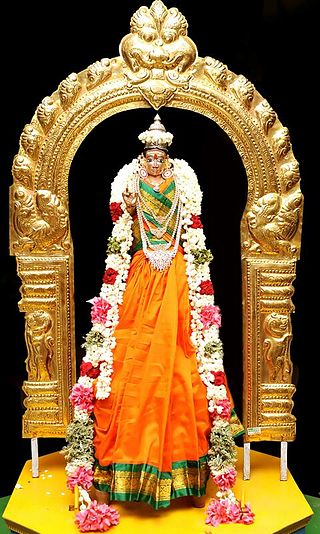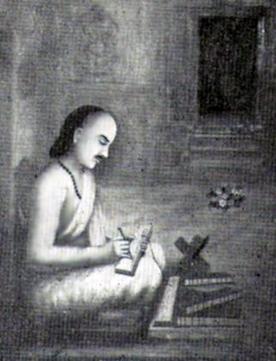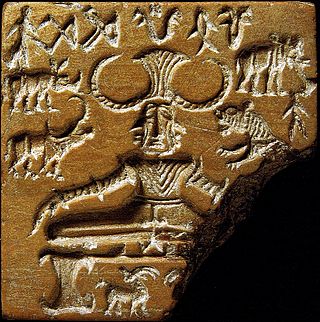Related Research Articles

Indian religions, sometimes also termed Dharmic religions or Indic religions, are the religions that originated in the Indian subcontinent. These religions, which include Hinduism, Jainism, Buddhism, and Sikhism, are also classified as Eastern religions. Although Indian religions are connected through the history of India, they constitute a wide range of religious communities, and are not confined to the Indian subcontinent.
Kalki, also called Kalkin, is the prophesied tenth and final incarnation of the god Vishnu. He is described to appear in order to end the Kali Yuga, one of the four periods in the endless cycle of existence (Krita) in Vaishnava cosmology. The end of the Kali Yuga states this will usher in the new epoch of Satya Yuga in the cycle of existence, until the Mahapralaya.

Draupadi, also referred to as Krishnaa, Panchali, and Yagyaseni is the main female protagonist of the Hindu epic Mahabharata, and the common consort of the five Pandava brothers—Yudhishthira, Bhima, Arjuna, Nakula, and Sahadeva. She is noted for her beauty, courage, and polyandrous marriage.
Varṇa, in the context of Hinduism, refers to a social class within a hierarchical caste system. The ideology is epitomized in texts like Manusmriti, which describes and ranks four varnas, and prescribes their occupations, requirements and duties, or Dharma.

Karna, also known as Vasusena, Anga-raja, and Radheya, is one of the main protagonists of the Hindu epic Mahābhārata. He is the son of the sun god Surya and princess Kunti, and thus a demigod of royal birth. Kunti was granted the boon to bear a child with desired divine qualities from the gods and without much knowledge, Kunti invoked the sun god to confirm it if it was true indeed. Karna was secretly born to an unmarried Kunti in her teenage years, and fearing outrage and backlash from society over her premarital pregnancy, Kunti had no choice but to abandon the newly born Karna adrift in a basket on the Ganges, in the hope that he finds foster parents. The basket is discovered, and Karna is adopted and raised by foster Sūta parents named Radha and Adhiratha Nandana of the charioteer and poet profession working for king Dhritarashtra.

Narayanappa, known by his pen name Kumara Vyasa, was an influential and classical Vaishnava poet of early 15th century in the Kannada language. His pen name is a tribute to his magnum opus, a rendering of the Mahabharata in Kannada. Kumara Vyasa literally means "Little Vyasa" or "Son of Vyasa". He was the contemporary and archrival of the famous Veerashaiva poet laureate Chamarasa who wrote the seminal work Prabhulingaleele covering the lives of Allama Prabhu and other Shiva Sharanas, circa 1435. Both poets worked in the court of Deva Raya II.
Hindu texts present diverse views on the position of women, ranging from feminine leadership as the highest goddess, to limiting gender roles. The Devi Sukta hymn of Rigveda, a scripture of Hinduism, declares the feminine energy as the essence of the universe, the one who creates all matter and consciousness, the eternal and infinite, the metaphysical and empirical reality (Brahman), the soul, of everything. The woman is celebrated as the most powerful and the empowering force in some Hindu Upanishads, Sastras and Puranas, particularly the Devi Upanishad, Devi Mahatmya and Devi-Bhagavata Purana.
Indology, also known as South Asian studies, is the academic study of the history and cultures, languages, and literature of the Indian subcontinent, and as such is a subset of Asian studies.

The Smartatradition, also called Smartism, is a movement in Hinduism that developed and expanded with the Puranas genre of literature. It reflects a synthesis of four philosophical strands, namely Uttara Mīmāṃsā, Advaita, Yoga, and theism. The Smarta tradition rejects theistic sectarianism, and is notable for the domestic worship of five shrines with five deities, all treated as equal – Ganesha, Shiva, Shakti, Vishnu and Surya. The Smarta tradition contrasted with the older Shrauta tradition, which was based on elaborate rituals and rites. There has been a considerable overlap in the ideas and practices of the Smarta tradition with other significant historic movements within Hinduism, namely Shaivism, Brahmanism, Vaishnavism, and Shaktism.

Iravan also known as Iravat and Iravant, is a minor character from the Hindu epic Mahabharata. The son of Pandava prince Arjuna and the Naga princess Ulupi, Iravan is the central deity of the cult of Kuttantavar (Kuttandavar) which is also the name commonly given to him in that tradition—and plays a major role in the sect of Draupadi. Both these sects are of Tamil origin, from a region of the country where he is worshipped as a village deity and is known as Aravan. He is also a patron god of well-known transgender communities called Alis.

The Vanniyar, also spelled Vanniya, formerly known as the Palli, are a Dravidian community or jāti found in the northern part of the Indian state of Tamil Nadu.
Alha was a legendary general of the Chandel king Paramardideva, who fought Prithviraj Chauhan in 1182 CE. He is one of the main characters of the Alha-Khand ballad.
Konar (Kōṉār) is Hindu caste found in the Indian state of Tamil Nadu. They are traditionally a pastoral community involved in cattle herding and cultivation. They are a part of the Yadav community. They also known as Ayar and Idaiyar, and appear in the ancient Sangam literature as occupants of the Mullai.

Rudolf von Roth was a German Indologist, founder of the Vedic philology. His chief work is a monumental Sanskrit dictionary, compiled in collaboration with Otto von Böhtlingk.
James L. Fitzgerald is an Indologist at Brown University. He studied at the University of Chicago, receiving his B.A. in 1971, his M.A. in Sanskrit in 1974 and his Ph.D. in Sanskrit and South Asian Civilizations in 1980. At Chicago he studied primarily with J. A. B. van Buitenen. From 1978 Fitzgerald joined the Department of Religious Studies at the University of Tennessee. In 2007 he was appointed Purandara Das Distinguished Professor of Sanskrit in the Department of Classics, Brown University.

The practice of Hindu animal sacrifice is in recent times mostly associated with Shaktism, and in currents of folk Hinduism strongly rooted in local popular or tribal traditions. Animal sacrifices were part of the ancient Non-Vedic Era in India, and are mentioned in scriptures such as the Puranas. The practice declined during the formation of Hindu synthesis as Hindu scriptures like the Bhagvad Gita forbid animal sacrifice. However, the perception that animal sacrifice was only practiced in ancient Non-Vedic Era is opposed by instances like Ashvamedha and other rituals that are rooted in Vedas.
Hindu denominations, sampradayas, traditions, movements, and sects are traditions and sub-traditions within Hinduism centered on one or more gods or goddesses, such as Vishnu, Shiva, Shakti and so on. The term sampradaya is used for branches with a particular founder-guru with a particular philosophy.

The Pashupati seal, is a steatite seal which was uncovered in Mohenjo-daro, Pakistan, a major urban site of the Indus Valley civilisation ("IVC"), during excavations in 1928–29, when the region of Pakistan was under British rule. The excavations were carried out by the Archaeological Survey of India, the official body responsible for preservation and excavation. The seal depicts a seated figure that is possibly tricephalic. The seated figure has been thought to be ithyphallic, an interpretation that has been questioned by many, but was still held by the IVC specialist Jonathan Mark Kenoyer in a publication of 2003. The man has a horned headdress and is surrounded by animals. He may represent a horned deity.
Paul Hacker was a German Indologist, who coined the term Neo-Vedanta in a pejorative way, to distinguish modern developments from "traditional" Advaita Vedanta.
Vishwa Adluri specializes in Indian philosophy. He is a strong critic of the academic discipline of Indology.
References
- ↑ Kitson, Moon, Caitlin, Rachel (May 23, 2023). "Former religion professor, celebrated Hinduism specialist dies at 80". The GW Hatchet. Retrieved June 25, 2023.
{{cite web}}: CS1 maint: multiple names: authors list (link) - ↑ "Alf Hiltebeitel no more". groups.google.com. Retrieved 2023-06-25.
- ↑ "Reading the Fifth Veda: Studies on the Mahābhārata - Essays by Alf Hiltebeitel, Volume 1". Reading the Fifth Veda. BRILL. 27 July 2011. ISBN 9789004216204 . Retrieved 2015-02-18.
- 1 2 3 4 "Alf Hiltebeitel" (PDF). George Washington University. Retrieved 2015-02-18.